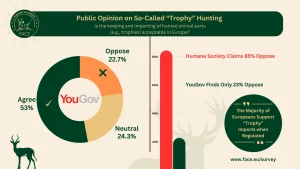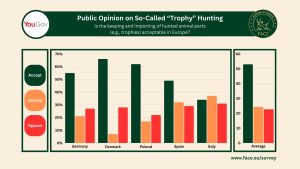New Survey Sheds Light on European Acceptance of “Trophy” Hunting – 77% Approve or Neutral
BRUSSELS – JAN. 24, 2024 – A coalition of international sustainable use organizations (European Federation for Hunting and Conservation, International Council for Game and Wildlife Conservation, Safari Club International, Dallas Safari Club, Wild Sheep Foundation, Conservation Force, and the International Professional Hunters Association) commissioned a recent survey that has unveiled a significant acceptance of international hunting, often mislabeled as “trophy” hunting.
The independent sample survey by YouGov of more than 7,000 Europeans from five countries, shows that a majority of EU citizens accept hunting. Only 23% disagree with keeping animal parts, a practice often referred to as “trophy” hunting, whilst 77% either approve or are neutral.
 Recognizing the critical role of hunting in wildlife management and ecosystem sustainability, the European Federation for Hunting and Conservation (FACE) along with key partners acknowledged the necessity to present an accurate understanding of Europeans’ attitudes towards hunting practices in Europe especially considering the Humane Society International (HSI)’s survey published in 2021 which claimed a Europe-wide opposition to “trophy” hunting. This survey, by emphasizing the negative aspects of trophy hunting, risks shaping public opinion and policy based on a limited understanding of the full spectrum of hunting activities.
Recognizing the critical role of hunting in wildlife management and ecosystem sustainability, the European Federation for Hunting and Conservation (FACE) along with key partners acknowledged the necessity to present an accurate understanding of Europeans’ attitudes towards hunting practices in Europe especially considering the Humane Society International (HSI)’s survey published in 2021 which claimed a Europe-wide opposition to “trophy” hunting. This survey, by emphasizing the negative aspects of trophy hunting, risks shaping public opinion and policy based on a limited understanding of the full spectrum of hunting activities.
Starkly contrasting HSI’s claim that 85% of Europeans oppose “trophy” hunting, their misdirection has resulted in several national parliaments initiating efforts to ban “trophy” imports.
The International Union for Conservation of Nature (IUCN) briefing paper, states that “trophy hunting…can and does generate critically needed incentives and revenue for government, private and community landowners to maintain and restore wildlife as a land use and to carry out conservation actions”
The survey, conducted in November 2023, aimed to ascertain unbiased public opinion on the social acceptance of domestic and international hunting. A focus was on the retention of animal parts (e.g. horns, antlers, etc.) as well as the acceptance of hunting that benefits conservation.
These findings challenge a narrow perception of hunting as solely targeting “trophies” of charismatic species, as often propagated by animal rights organisations.
For the complete report on the public attitude toward “trophy” hunting, see here.



